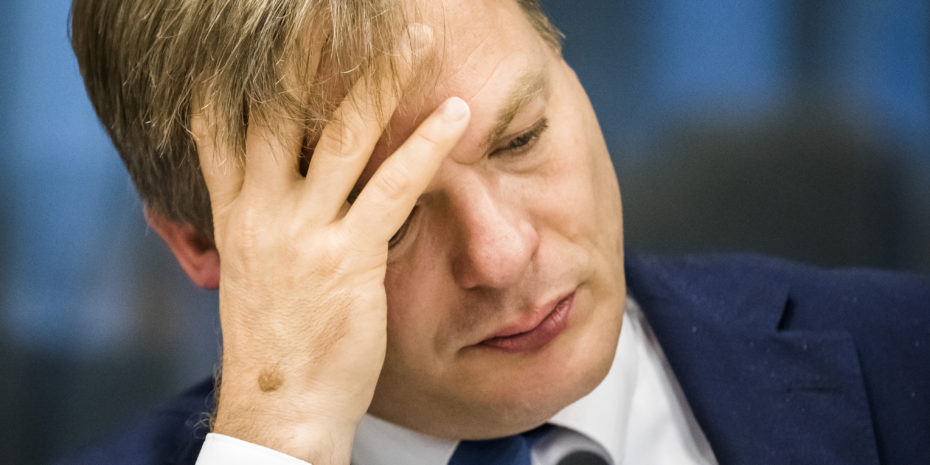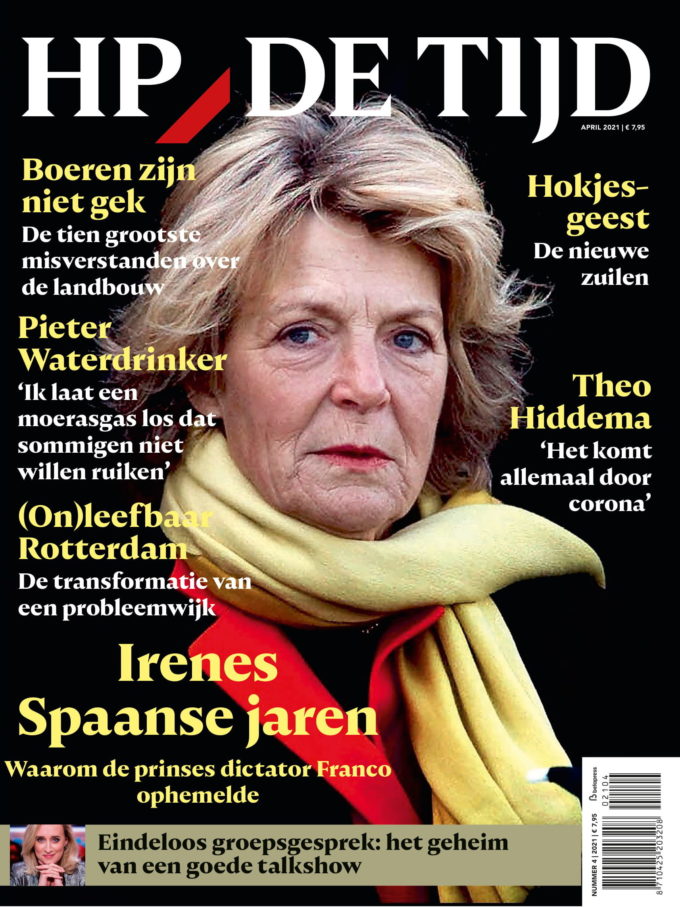Mei 2015 verklaarde Geert Mak heldhaftig tegenover The Irish Times:
You have to show courage. You have to empathize with what is happening in your society, and where necessary you must have the courage to oppose. This elite has become fearful and has lost that courage.
https://www.irishtimes.com/news/world/europe/dutch-deep-thinker-says-like-minded-elites-must-oppose-racism-of-wilders-1.2199761
In zijn bestseller Reizen zonder John. Op zoek naar Amerika (2012) beweert Geert Mak met grote stelligheid dat de Amerikaanse Onafhankelijkheidsverklaring ‘een van de mooiste staatsdocumenten’ is ‘die ooit zijn geschreven,’ hetgeen onmiddellijk de vraag oproept hoeveel onafhankelijkheidsverklaringen mijn oude vriend gelezen heeft. Nog afgezien van deze smaakkwestie, is Mak’s volgende bewering op zijn minst twijfelachtig: over Thomas Jefferson, de slaveneigenaar die had geschreven ‘We hold these truths to be self-evident, that all men are created equal, that they are endowed by their Creator with certain unalienable rights, that among these are Life, Liberty and the Pursuit of Happiness,’ verkondigde het orakel van Jorwerd dat Jefferson’s
uitgangspunt een staat [was] waarin de burgers niet alleen rechten hadden om zich tegen machthebbers te verdedigen — zoals hier en daar in Europa al het geval was —- maar waarin alle soevereiniteit bij het volk werd gelegd.
In de Constitutie werd het systeem verder uitgewerkt: de Verenigde Staten van Amerika zouden samen een federatie vormen, die de macht deelde met de diverse staten en, uiteindelijk, het Amerikaanse volk.
Dit mag dan wel mooi klinken in de oren van een ongeïnformeerde lezer, maar in werkelijkheid is hier sprake van aloude propaganda van ingehuurde broodschrijvers als Mak. Wanneer hij uit ‘een van de mooiste staatsdocumenten’ citeert ‘dat alle mensen als gelijken worden geschapen,’ en ‘dat zij door hun schepper met zekere onvervreemdbare rechten zijn begiftigd,’ waaronder zich ‘bevinden het leven, de vrijheid en het nastreven van geluk,’ dan verzuimt ‘de populairste geschiedenisleraar van Nederland’ te vermelden dat vrouwen, witte slaven (indentured servants) en degenen zonder bezit geen stemrecht bezaten. Bovendien hadden zwarte slaven én de oorspronkelijke bewoners, de Indianen, al helemaal geen enkel recht. Die spelen dan ook geen rol van betekenis in Mak’s eurocentrische, c.q. witte, ‘geschiedschrijving.’ Toch is het volgende bekend over de welgestelde grootgrondbezitter Jefferson uit de staat Virginia:
Virginia played a central role in the American Revolution. Forty per cent of the country’s slaves were to be found there, but a majority of the authors of the rebellion unleashed in the name of liberty also came from there. For thirty-two of the United States’ first thirty-six years of existence, slave owners from Virginia occupied the post of president. This colony or state, founded on slavery, supplied the country with its most illustrious statesmen. It is enough to think of George Washington (great military and political protagonist of the anti British revolt) and Thomas Jefferson and James Madison (authors, respectively, of the Declaration of Independence and the federal Constitution of 1787), all three of them slave owners. Regardless of this or that state, the influence slavery exercised on the country as a whole is clear. Sixty years after its foundation, we see that ‘of the first sixteen presidential elections, between 1788 and 1848, all but four placed a southern slaveholder in the White House,’
aldus Domenico Losurdo, de in 2018 overleden Italiaanse filosoof en historicus. In zijn Liberalism. A Counter-History (2014), dat door de Financial Times werd gekwalificeerd als ‘a brilliant exercise in unmasking liberal pretensions,’ laat hij omstandig zien hoe Amerikaanse zowel als Britse ‘liberal’ theoretici en politici uit de zeventiende, achttiende en zelfs nog de negentiende eeuw ‘were firmly committed to the defense of colonial slavery.’ Over ‘one of the major authors and great minds in the liberal tradition and pantheon,’ de zeventiende eeuwse Engelse Verlichtingsfilosoof John Locke, merkt Losurdo op dat dit boegbeeld van ‘liberalism’:

Ik blijf wat uitgebreider stilstaan bij de valse voorstelling van zaken met betrekking tot Thomas Jefferson -- volgens Mak 'een man van de Verlichting' -- omdat het verschil tussen mythe en werkelijkheid bij hem zo groot is. Zo verwees de inmiddels overleden Amerikaanse historicus Richard Drinnon naar het 'brilliantly iconoclastic' portret van Jefferson and Civil Liberties uit 1963, waarin de Amerikaanse historicus en Pulitzer Prijs-winnaar, wijlen professor Leonard W. Levy, beschreef hoe Jefferson als:
ideologue of freedom came out for dictatorship in times of crisis, supported loyalty oaths, favored prosecution — at the state level — for 'seditious' libel, accepted concentration camps for the politically unreliable, adopted censorship, and indulged in other authoritarian acts that led Levy to find 'a strong pattern of un-libertarian, even anti-libertarian thought and behavior extending throughout Jefferson's long career.’
Op zijn beurt merkt Drinnon in zijn boek Facing West. The Metaphysics of Indian-Hating and Empire Building (1997) over Jefferson's diepgeworteld racisme op dat:
in Notes on the State of Virginia (Paris, 1785) he tried to extricate himself by depicting blacks as creatures of the body and sensation rather than of the mind and reflection, and doubted their fitness for freedom; but he disguised this 'anti-negro diatribe' by casting it as a scientific hypothesis...
Jefferson, die bij zijn slavin, Sarah ‘Sally' Hemings, zes kinderen verwekte, was een rijke aristocraat uit Virginia met een:
great personal aversion to miscegenation, or, as he put it, ‘to the mixture of color here.’
Om te voorkomen dat er ‘rassenvermenging’ zou ontstaan en:
stain 'the blood of the master,' the great revolutionary proposed to rid the country of them all, those previously freed and those newly emancipated: through 'expatriation' to Afrika or the West Indies — he wavered on 'the most desirable receptacle' — the problem would disappear with the last shipload,
aldus Jefferson, die -- opnieuw de veel geprezen Geert Mak -- 'alle soevereiniteit bij het volk' wilde leggen. Ook Jefferson's standpunt ten aanzien van Indianen is veelzeggend. De oorspronkelijke bewoners van de VS, van wie hij en de zijnen letterlijk het land stal, mochten van Jefferson blijven op voorwaarde dat:
they should give up the chase, dispose of lands needed only for hunting, become tawny yeomen farmers, and intermix with the white population.
Op 3 november 1802, Jefferson was inmiddels de derde president van de VS geworden, schreef hij aan Handsome Lake — die door de Seneca-indianen als een groot profeet werd vereerd — dat diens angst voor het verlies van nog meer land aan de witte kolonisten volkomen ongegrond was. Jefferson:
You remind me, brother, of what I said to you when you visited me the last winter, that the lands you then held would remain yours, and shall never go from you but when you should be disposed to sell. This I now repeat and will ever abide by.
Nog geen twee maanden na Jefferson’s geruststellende woorden:
a working paper 'Hints on the Subject of Indian Boundaries' contained Jefferson's covert suggestions for extinguishing titles to lands they refused to sell; the following month a confidential message shared his disingenuous hints with Congress — minus some awkward details — on how to undermine Indian leaders who persisted 'obstinately in these dispositions.' Though duty required him to submit his views to the legislature, he warned that, 'as their disclosure might embarrass and defeat their effect, they are committed to the special confidence of the two houses.' Therewith he secretly launched a systematic campaign of psychological warfare against the tribes... it entrapped their leading men into running up debts at government trading posts so they would have to sell their lands to pay... Jefferson's letters to lieutenants in the field filled in the details,
aldus wederom de Amerikaanse historicus Richard Drinnon, die hieraan toevoegde:
Jefferson's letter to Governor William Henry Harrison of the Indiana Territory revealed most candidly how the trap should be sprung, leaving the Indians dependent on the market economy and relieved of their extensive forests:
'To promote this disposition to exchange lands, which they have to spare and we want, for necessaries, which we have to spare and they want, we shall push our trading uses, and be glad to see the good and influential individuals among them run in debt, because we observe that when debts get beyond what the individuals can pay, they become willing to lop them off by a cession (afstand doen. svh) of lands.’
Belangrijk is ook het volgende te onthouden:
The Haitian Revolution created the second independent country in the Americas after the United States became independent in 1783. U.S. political leaders, many of them slaveowners, reacted to the emergence of Haiti as a state borne out of a slave revolt with ambivalence, at times providing aid to put down the revolt… Under President Thomas Jefferson’s presidency, the United States cut off aid to L’Ouverture (leider van de Haïtiaanse Revolutie, die leidde tot de afschaffing van de slavernij en de onafhankelijkheid van de Franse kolonie Saint-Domingue als de republiek Haïti. svh) and instead pursued a policy to isolate Haiti, fearing that the Haitian revolution would spread to the United States. These concerns were in fact unfounded, as the fledgling Haitian state was more concerned with its own survival than with exporting revolution. Nevertheless, Jefferson grew even more hostile after L’Ouverture’s successor, Jean-Jacques Dessalines, ordered the execution of whites remaining after the Napoleonic attempts to reconquer St. Domingue and reimpose slavery (French defeat led to the Louisiana Purchase.) Jefferson refused to recognize Haitian independence, a policy to which U.S. Federalists also acquiesced. Although France recognized Haitian independence in 1825, Haitians would have to wait until 1862 for the United States to recognize Haiti’s status as a sovereign, independent nation.
https://history.state.gov/milestones/1784-1800/haitian-rev
Kortom, Geert Mak’s stelling dat de Amerikaanse Onafhankelijkheidsverklaring ‘een van de mooiste staatsdocumenten’ is ‘die ooit zijn geschreven,’ omdat zij er vanuit zou gaan ‘dat alle mensen als gelijken worden geschapen,’ en ‘dat zij door hun schepper met zekere onvervreemdbare rechten zijn begiftigd,’ is gebaseerd op een illusie, en daardoor een makkelijk aantoonbare leugen. Maar zoals met alles in Nederland, wordt deze leugen als zoete koek geslikt zowel door de massa als de polder-intelligentsia. Zijn betoog demonstreert Mak’s schrijnende gebrek aan ‘dapperheid.’ Juist hij is het levende bewijs van het feit dat ook de polder-‘elite has become fearful and has lost that courage.’ Ondermeer zijn lafheid vormt in deze crisistijd een groot gevaar voor de toekomst van het Westen. Daarover volgende keer meer.












